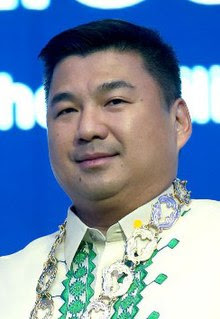 |
| Picture from Uy's Wikipedia Page |
To understand what a Follow-On Offer is, let's start with the word "Offer". An "Offer", as it relates to the stock market, is short for "Offer of Shares" A company offers new shares of stock (representing ownership in the company) to the investing public to raise more capital and expand its business. To take a very a simple and imaginary illustrative example - Let's say five friends who own a very successful neighborhood grocery want to take the next step and open up a supermarket, but they lack the capital. One thing they could do is to take in new investors who will bring in additional capital. These new investors would receive shares of stock as proof that they are now part-owners of this very-successful-grocery-turning-supermarket.
If a company offers the opportunity to invest not just to specific parties but to the public at large, be it local, foreign, or usually both, then it is a Public Offering, and the first time a company does this, it is called an Initial Public Offering - hence the more familiar term IPO.
Next let's say that the new supermarket was also a smashing success, so much so that the owners - now many more than the original five - want to take the supermarket nationwide and open up branches all over the archipelago, but to do so they would now need even more capital. One thing they could do is to take in even more investors, to bring in even more capital, by offering shares to the public again. This is no longer "Initial" since it has already been done before, hence it is called a Follow-On Offering or a Follow-On Offer.
The evolution of PH Resorts Group Holdings is a lot more complicated than a grocery-turned-supermarket-turned-supermarket-giant. First of all, when PH Resorts had an IPO, it was in a totally different industry, with a totally different name, and Dennis Uy was not yet part of the company. Uy's Udenna Holdings bought into the original listed company in 2018, renamed it, and plans to use it as the company to undertake massive integrated resort-casino projects in different parts of the Philippines. To undertake these projects it needs capital, a lot of it, and hence began to undertake an FOO.
But last week's announcement that the FOO was deferred indefinitely, would seem to indicate that investor response was lukewarm, and the wording of the announcement, which emphasizes that the company is still "very keen" on pursuing an offering and "fully intends" to do so at a later time provides further indication that the FOO was probably shelved because of a tepid response.
To my way of thinking, if the investment bankers who make investing decisions - supposedly the best at what they do - turn down an opportunity to invest in a company, the reason is usually one of these four:
1) They do not believe in the company's viability.
2) They do not believe in the company's management.
3) They do not believe in the econo-political regime that the company is in.
4) They might believe in the company but find the cost of investing too high.
In the case of PH Resorts I humbly submit a fifth possible reason:
5) They believe that the main personality behind the company is a politically exposed person and his business future is unpredictable.
In short, I consider the signals being sent by the international business community, in its collective decision to more or less decline to participate in PH Resorts, to be slightly worrisome. I believe it shows a belief, that the future of the Philippine economy is, at best, a bit too random, a bit too uncertain. They could be wrong, of course, and that would be great for us as a nation. But at the very least I think it does show that our collective economic future is not buoyed by overflowing optimism, which is, well, disconcerting...